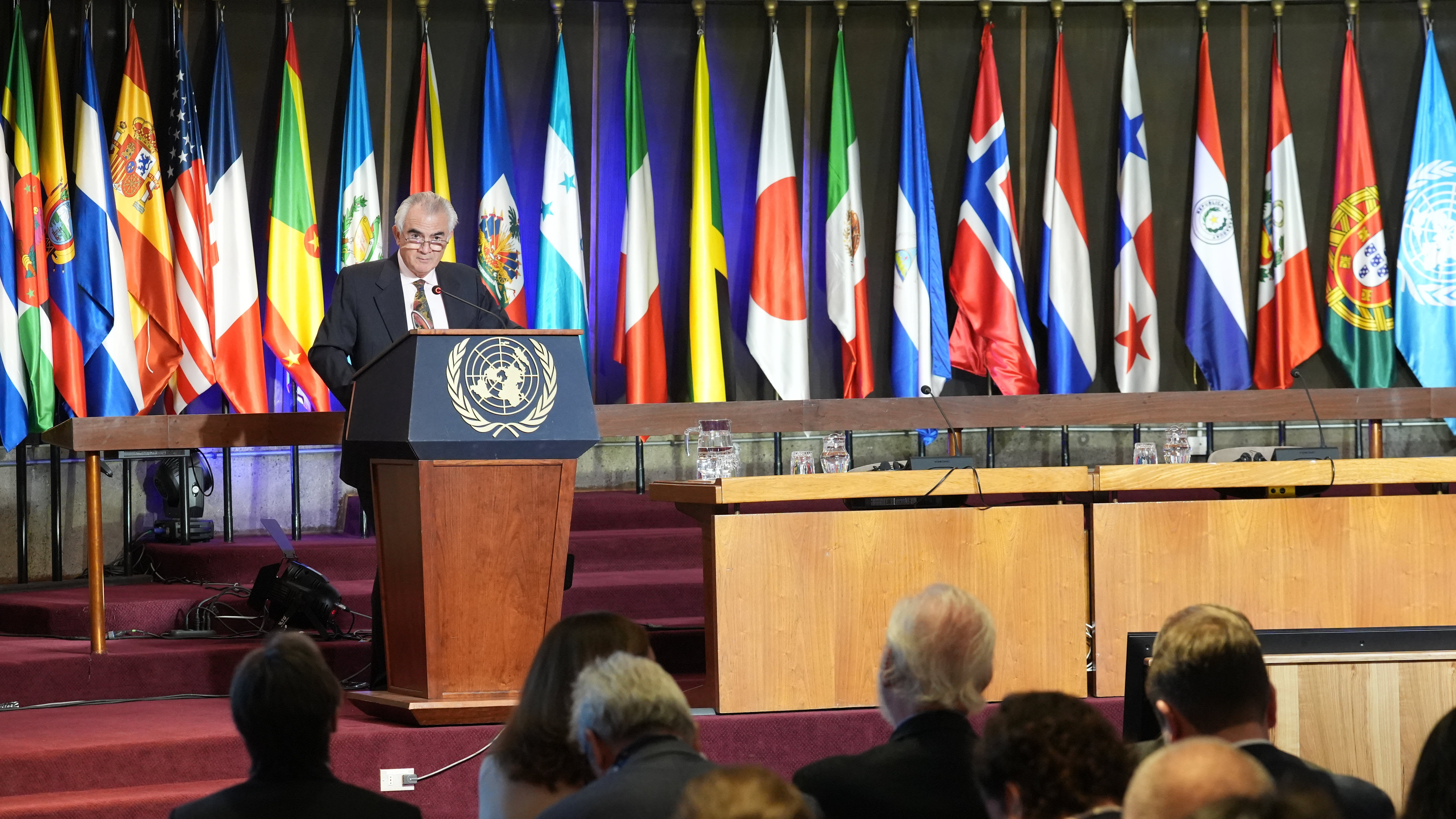ECLAC and CAF Call for Scaling Up and Improving Productive Development Policies in Latin America and the Caribbean
Work area(s)
Only in this way will the region be able to escape the low-growth trap in which it is caught, authorities and experts affirmed at the joint Annual Conference held by both organizations in Santiago, Chile.

To achieve a more productive, inclusive and sustainable development pattern, it is urgently necessary to scale up and improve productive development policies. This goes to the heart of the development models in the region and is essential to their transformation, according to the authorities and experts gathered today at the CAF-ECLAC Annual Conference 2024, which is taking place at the central headquarters of the Economic Commission for Latin America and the Caribbean (ECLAC) in Santiago, Chile.
The high-level event – which on this occasion is entitled “The challenge of scaling up and improving productive development policies in Latin America and the Caribbean” – brings together Economy, Trade and Industry Ministers and Deputy Ministers and senior executives and experts from regional and multilateral organizations to reflect on and address in-depth the elements that would enable moving forward on designing and implementing a regional agenda for productive development policies to guide national and subnational governments, academia, private actors and other members of civil society in the region in carrying out joint actions for sustainable and inclusive productive development.
The meeting was inaugurated by José Manuel Salazar-Xirinachs, ECLAC’s Executive Secretary, and Sergio Díaz-Granados, the Executive President of CAF-Development Bank of Latin America and the Caribbean. It featured a panel of authorities on productive development policies in Latin America and the Caribbean that included the participation of Nicolás Grau, Minister of Economy, Development and Tourism of Chile; José Antonio Ocampo, Professor at Columbia University’s School of International and Public Affairs and former Minister of Finance of Colombia; Soraya Caro, Deputy Minister of Business Development of Colombia; and Gonzalo Rivas, Head of the Competitiveness, Technology and Innovation Division at the Inter-American Development Bank (IDB).
In his welcome remarks, ECLAC’s Executive Secretary, José Manuel Salazar-Xirinachs, recalled that the root of the problem is that the region has been immersed in a low-growth syndrome or trap for the last decade. He stressed that growth per se is not everything, since the aim is to have inclusive growth, which would reduce poverty and labor informality and create good jobs and an environment more conducive to reducing inequality, and would also be green and sustainable growth that is friendly to nature and the planet.
“If the region invests enough in the transition to renewable energies, electromobility, the circular economy, to more dynamic sectors that drive growth, such as the care society (among others), and moves towards these transformations, the result will necessarily be higher and more sustained growth that is more diversified and more technologically sophisticated. And that is what productive development policies are about. It is about inducing dynamism and transformation in the economy and society. Because in productive development policies lies the toolbox for steering growth in certain directions and towards higher and more sustained rates, which means orienting processes of economic transformation towards more inclusive and sustainable development patterns,” he stated.
“We at ECLAC have been saying that it will not be enough to insist that our countries and their territories scale up and improve their productive development policies. Delving deeper into the ‘whats’ and the ‘hows’ behind this premise will be key. That is why we understand the space that we are organizing today as a new opportunity for these reflections. But also as a time to promote renewed collaboration, not just between CAF and ECLAC on productive development policies, but also between public and private actors in the region,” the senior United Nations official added.
Meanwhile, Sergio Díaz-Granados, Executive President of CAF-Development Bank of Latin America and the Caribbean, indicated that “the region continues to be stuck in low productivity that limits its growth and, therefore, the possibility of achieving the goals of overcoming poverty, of greater equality and, ultimately, of greater well-being for our citizens. That is why we value the relevance of this kind of debate where our commitment is focused on pouring all our efforts into supporting the transition that the region needs, backing this challenge of moving towards sustainable development.”
In the first session on productive development policies in the region, the ministers, deputy ministers and authorities present stressed the importance of making progress on issues such as institutional capacities, technological development, financing, productive linkages, support for small producers and tax incentives to reverse the stagnation in productivity seen in the majority of the region’s countries and to be able to articulate productive development policies that, in the end, would allow for improving all people’s well-being, which is their ultimate goal.
The CAF-ECLAC Annual Conference continued with four sessions on issues such as the role of development banking in productive development agendas; productive development policies with a territorial approach and cluster initiatives; closing human talent gaps for productive development; and opportunities for collaboration between governments, the private sector, development banks and other relevant actors to scale up and improve productive development policies in the region.
Related content
Conferencia Anual CAF-CEPAL “El reto de escalar y mejorar las políticas de desarrollo productivo en América Latina y el Caribe”
Palabras de José Manuel Salazar-Xirinachs, Secretario Ejecutivo de la CEPAL.
Related link(s)
Country(ies)
- Latin America and the Caribbean
Contact
Public Information Unit
- prensa@cepal.org
- (56 2) 2210 2040